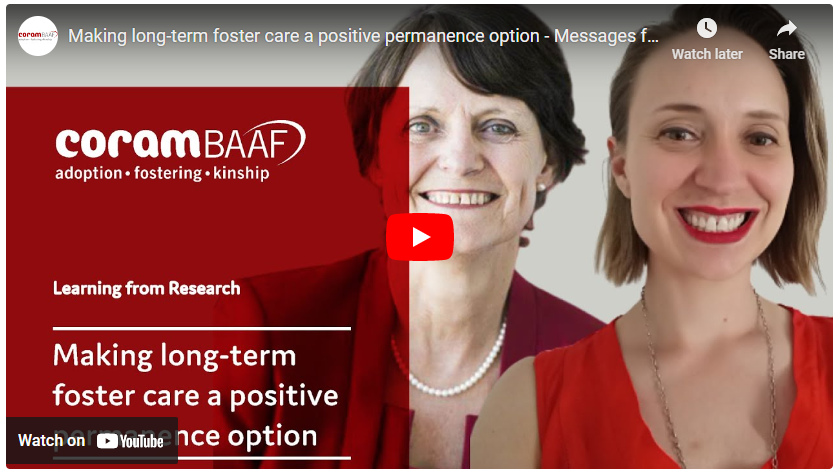Learning from Research: Making long-term foster care a positive permanence option- Messages from 25 years' of research
Long-term foster care was included as a permanence option in policy and care planning in England from the 1980s, when permanence first became a goal of the children’s social care system. However, it was not until 2015 that long-term foster care was defined in government regulations and guidance, with a required practice framework for local authorities (Department for Education 2015). This initiative from the government was intended to give long-term foster care a more formal status as a permanence option for children in care in England, alongside reunification, kinship care, special guardianship and adoption. The aim was also to ensure similar standards of good practice across local authorities and to promote stability and positive outcomes for children for whom long-term foster care was the agreed permanence plan.
A UEA research team, initially led by Gillian Schofield and then by Birgit Larsson, was funded by the Nuffield Foundation (2018-21) to investigate the implementation of the 2015 long-term foster care regulations and guidance. This study built on a series of projects led by Gillian Schofield at UEA from 1997, which had demonstrated the challenges but also the opportunities and the importance of providing high quality long-term foster care.
This webinar was presented by Gillian Schofield and Birgit Larsson. It explored and assessed their research on long-term foster care as a permanence option, including this most recent study. It considered the implications of these research findings for policy and practice and for the future of long-term foster care in the context of the report of the Independent Children’s Social Care Review (2022) and the publication of the Department for Education’s proposed implementation strategy and Children’s Social Care National Framework (2023).
WEBINAR CLIP - THE IMPORTANCE OF RELATIONSHIPS: LONG-TERM FOSTER CHILDREN'S ADVICE
WATCH THE FULL RECORDING
Members, sign in to your account to be able to access the recording of this webinar. Click on the image below to sign in and watch the recording.

PRESENTERS
Emeritus Professor Gillian Schofield OBE is based in the Centre for Research on Children and Families at the University of East Anglia, which she joined in 1990. An experienced social worker, Professor Schofield has research and practice interests in attachment and development; abuse and neglect; permanence in long-term foster care; care and offending; LGBTQ young people in care; and moving from foster care to adoption. Based on their foster care research, Professor Schofield and her colleague Dr Mary Beek developed the Secure Base model of therapeutic caregiving, which is widely used in the UK and in diverse countries, including China and Thailand where it has supported the establishment of foster care as an alternative to institutional care.
Professor Schofield has published a range of peer-reviewed articles and books in the field of child placement and child welfare, including (with Mary Beek) Providing a Secure Base in Long-term Foster Care (2004), Attachment Handbook for Foster Care and Adoption (2006, 2nd edition 2018) and The Secure Base Model: Promoting attachment and resiliencein foster care and adoption (2014, 2nd edition 2023), all published by CoramBAAF.
Dr. Birgit Larsson is a Lecturer in Social Work and Sociology at the University of East Anglia. Since 2010, she has worked on and led a series of research projects in the Centre for Research on Children and Families involving vulnerable people and young people in the care system, including studies on care and offending; LGBTQ young people in care; children who return home from care (reunification); and the recent study of the implementation of long-term foster care regulations and guidance.
Dr. Larsson has an interest in a range of methods from narrative analysis to the quantitative analysis of big data sets and has published a range of reports and articles that relate research findings to practice.
For social workers, reflection on this session may contribute to your continuing professional development (CPD).
Members can watch recordings of previous Learning from Research Webinars here.
WHO IS THIS SESSION FOR?
The session is aimed at social workers, managers, panel members, other professionals, foster and kinship carers, as well as special guardians and adopters. It is also relevant to those involved or interested in Policy and its influence on practice and permanence.
FEES
Members: FREE (don't forget to log in to your account to receive your discount)
Non-members: £20+VAT.
Places on this event are limited, so early booking is recommended.
CONTACT
Telephone 020 7520 7520/0310
Email events@corambaaf.org.uk
£20.00
Sorry, but this is fully booked and tickets can no longer be purchased.
